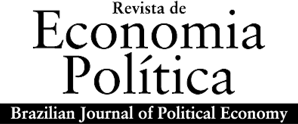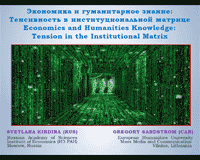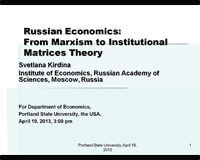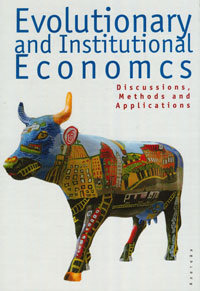 |
On September 22, 2024, the 24th China State-owned Economic Development Forum Svetlana Kirdina-Chandler delivered a plenary paper entitled |
 |
Svetlana Kirdina-Chandler presented her paper How does the change of world order in XXI century differ from previous era? at the the 36th Annual EAEPE Conference 2024 Economics in a changing world. New perspectives to economic analysis and economic policy (September 4-6, 2024, Bilbao, Spain) and took part in organising and holding two sessions «Polycrisis II: Polycrisis and an Emerging A New World Order. Challenges for Evolutionary Political Economy and Heterodoxies at large», where the discussions started at the previous conference in 2023 were continued. |
 |
Svetlana Kirdina-Chandler presented her paper Foundations and limitations of interdisciplinary synthesis in economic theory: the comparison between Russian-language and English-language discourses at the XI Euro-Asian Symposium on Economic Theory, Ekaterinburg, Russia, June 26-28. |
| Kirdina-Chandler S.G. (2023) An institutional perspective on money circulation: The heterodox approach Terra Economicus 21(3), 45–57 (in Russian). DOI:10.18522/2073-6606-2023-21-3-45-57 The paper aims at substantiating and applying the heterodox approach to analyze institutions related to money circulation in Russia. Orthodox economics, along with orthodox monetary theories, are usually associated with countries where the institutions of Y-matrix and market Y-economy have dominated throughout history. Russia is featured by the institutions of X-matrix and redistributive X-economy. This fact makes heterodox approach applicable to Russia, as well as to some other countries, that is confirmed by a comparison between orthodox and heterodox approaches to money circulation presented in the paper. Heterodox perspective is more practically-oriented and enables the researcher to address objectively institutions related to money circulation in terms of dynamics, uncertainty, and irreversibility.
|
 |
Svetlana Kirdina-Chandler, Russian Academy of Sciences, Russia, presented her paper The polycrisis: a methodological challenge for economics and possible response at the 35th Annual EAEPE Conference 2023 “Power and Empowerment in times of multiple crisis” which took place in Leeds, UK, on 3-15 September 2023 The polycrisis: a methodological challenge for economics and possible response In the 2020s, the various crises faced by the countries of the world have intertwined into one, which has been called the “global polycrisis” (Lawrence, Janzwood, Homer-Dixon, 2022). Its distinguishing feature is that the causes of these crises, as well as their consequences, are deeply interconnected. Therefore, the study of the modern polycrisis within the framework of one discipline, no matter how advanced it is, is problematic. In other words, the global polycrisis, which needs to be studied, is a real challenge for modern social sciences. This also applies to economics. The paper discusses possible methodological responses to this challenge, among them pluralism;
|
 |
Svetlana Kirdina-Chandler, Russian Academy of Sciences, Russia, presented her online paper Globalisation and Sovereignty in the 2020s: The Peak of Contradictions? at the Annual Meeting of the Association for Evolutionary Economics at the Allied Social Sciences Associations World at the Crossroads: Finding institutionalist pathways to social, economic and ecological co-existence, which took place in New Orleans, Louisiana, USA, on January 6-8, 2023 |
 |
Svetlana G. KIRDINA-CHANDLER Economic Theory, Ideology, and Economic Interests AlterEconomics, 2022, 19(1), pp. 71-92. The social significance of economic theory is widely discussed in Russia and in the world. The role of economic theory depends on the efforts of theoretical economists themselves as well as on the context of its development. Ideology and economic interests are important elements of this context. Therefore, the purpose of this study is to examine these elements and the relationship between economic theory, ideology and economic interests in Western countries, in China and the USSR by comparing neoclassical economic theory, “political economy with Chinese characteristics”, and political economy developed in the early Soviet period. Methodologically, the study relies on the methods of cross-country analysis, case study and biographical analysis. The study comprises three levels: individual, institutional, and societal. The individual level is represented by individual economists, more specifically, the focus will be made on Nikolai Kondratiev’s views and ideological preferences. The institutional level is represented by communities of economists working within common areas of interest. The societal level means that economic theory, ideology and economic interests are considered at the level of society as a whole. As a result of the study, similar patterns of development of neoclassical economic theory, Soviet political economy, and “political economy with Chinese characteristics” were identified. These similarities can be explained by the role of economic theory in society and the way economic knowledge is organized and functions. It was also shown that a mismatch between the development of economic theory, ideology and economic interests may have a negative impact. It was observed towards individual economists, what is shown in the example of Kondratiev, and specific areas of economic theory development in the period of Soviet political economy. |
 |
Svetlana Kirdina-Chandler presented the paper The Poverty of Economics in Reactions to Changes: The Need for a New Synthesis? at the Virtual Conference ICAPE (International Confederation of Associations for Pluralism in Economics), 9-10 January, 2022 |
 |
Svetlana Kirdina-Chandler. 2021. The System Paradigm and The Prospects For “Institutional Synthesis” In Economic Theory // Economics of Contemporary Russia [Ekonomiĉeskaâ nauka sovremennoj Rossii]. No.3 (94): pp. 17-32. The constant adaptation of economic theory to changing practice at certain stages requires a theoretical synthesis, during which various (sometimes competing) research programs are combined in order to develop a more adequate methodology. In orthodox economic theory the two most important syntheses were: the neoclassical synthesis of the 1940–1960s and the new neoclassical synthesis of the 1990s. Both were intradisciplinary in nature. However, the developed toolkit of neoclassical orthodoxy still does not allow the study of the “risks of the system as a whole” and making confident long-term forecasts of economic development.
|
 |
Svetlana Kirdina-Chandler presented the paper The Limits of synthesis in neoclassical economics and opportunities for heterodox economics at the 33rd Annual EAEPE Conference 2021 Recovery from the Covid-19 Pandemic: Re-thinking the role of the State towards safe, cohesive, sustainable, and innovative economies 2-4 September 2021 (online conference) |
 Dr. Svetlana Kirdina-Chandler taught an online course "Russia between East and West: Where to go?" (32 hours, in English) at the International Summer School, Renmin University of China (Beijing, July 2021). Dr. Kirdina-Chandler was the only one representing Russia among more than a hundred lecturers from all over the world. Dr. Svetlana Kirdina-Chandler taught an online course "Russia between East and West: Where to go?" (32 hours, in English) at the International Summer School, Renmin University of China (Beijing, July 2021). Dr. Kirdina-Chandler was the only one representing Russia among more than a hundred lecturers from all over the world.More ... |
 |
On July 21, 2021, Svetlana Kirdina-Chandler presented a paper “Cooperation versus competition: Kropotkin’s legacy in the works of economic evolutionists” at the International colloquium Pëtr Kropotkin – Activism and Scholarship July 19-23, 2021, San Paolo, Brazil. |
 |
Svetlana Kirdina-Chandler presented the paper The Mesolevel Approach as an Inter-disciplinary Methodology in Social Science and the Humanities for Cross-country Studies as an invited speaker at the 1st International Conference on Social Neuroscience in Ecologically Valid Conditions (Moscow, June 21-23, 2021 (online) |
 |
New book Mesoeconomics: Elements of A New Paradigm Vladimir Mayevsky & Svetlana KirdinaChandler (eds) Мoscow: Institute of Economics of the Russian Academy of Sciences, 2020. 392 р. In Russian (Content, Foreword and Introduction in English). The book summarizes the results of mesoeconomic studies presented in contemporary academic literature in English and Russian. The intradisciplinary structure of modern mesoeconomics is identified and justified. It includes the mesoeconomics of clearly localized structures (mainly industries and regions); mesoeconomics of network structures; institutional mesoeconomics, and mesoeconomics of reproduction. The book focuses on results achieved in two areas. Firstly, we introduce institutional mesoeconomics as the most powerful stream of mesoeconomic research to date. Secondly, we report the results obtained in mesoeconomics of reproduction which is a new original field researched at the Institute of Economics of the Russian Academy of Sciences (Moscow, Russia). It relies upon the provisions of the new theory of capital reproduction and institutional views on money circulation. The book is meant for economists and students of economic departments who are interested in modern research in the field of heterodox economics. |
 |
KIRDINA-CHANDLER S.G., KRUGLOVA M.S. S. 2019. «SOCIETY», «STATE» AND INSTITUTIONAL MATRIXES: THE CASE OF INTERDISCIPLINARY MESO-ANALYSIS SOZIS (Sociologicheskie Issledovaniya). № 10. Pp. 15-26. In Russian. DOI: 10.31857/S013216250007101-4 Abstract. The paper presents an example of interdisciplinarity in the development of sociological theory. It is about incorporating the immanent content of such language constants as «society» and «state» into the theory of institutional X-Y matrixes. For this purpose, the method of interdisciplinary meso-analysis is used, which allows us to systematise and organise knowledge from linguistics, obtained by etymological analysis, and apply it in sociological studies. In our sample we compare the etymology of the words «society» and «state» in the languages of those countries where X-matrix institutions dominate (Russian, Chinese, Japanese, Hindi / Sanskrit) and Y-matrix institutions dominate (English, French, German). It is shown that the etymology of the language constants «society» and «state» in the investigated languages quite clearly reflects the essential features of institutional organisation in countries with different dominant matrixes. Thus, it was revealed that the construction of such a basic language constant as «society» in the countries with the dominance of a Y-matrix follows the logic «from the particular to the general», or the deductive logic of aggregation «from the bottom» (bottom-up) – from individuals to society. In turn, for countries with the dominance of X-matrix, the etymological analysis of the word «society» reveals the inductive logic «from the general to the particular», or «from the top» (top-down) – when the whole (society) is pre-eminent in relation to individuals who are secondary in relation to it. Also, a different etymology of the language constant «state» has been revealed in countries with a dominance of the X- or Y-matrix. The results obtained are not only additional evidence of significant differences between societies with the dominance of institutional X- or Y-matrixes, but also substantiate the relevance and application of meso-analysis when conducting such interdisciplinary research. They also serve as a contribution to the development of linguistic sociology, since they show the relationship between the types of societies (their social structures) and the content of the most important linguistic constants that are characteristic of these types of societies, «cleansed» from the cultural context. The results obtained are also important for deeper understanding in international communication between sociologists. |
 |
Kirdina-Chandler, S. G. (2019) Mechanism of money circulation as a subject of mesoeconomic analysis Journal of Institutional Studies, 11(3), 007-020. DOI: 10.17835/2076- 6297.2019.11.3.007-020. In Russian. Abstract. The paper discusses the reasons and prospects for the inclusion of institutions and mechanisms of money circulation in the scope of mesoeconomic research. In the first part of the paper the institution of money is analysed from the perspective of methodological institutionalism. It is shown that the institution of money is a functional-temporal structure, and structures of this type are the main subject of study in mesoeconomics. The second part of the paper tests the hypothesis that the separation of structural sections of economic theory (microeconomics, macroeconomics and then mesoeconomics) is associated with the introduction into economic analysis of increasingly sophisticated theoretical ideas about money circulation in the economic system. The specificity of the mesoeconomic approach to the analysis of money circulation consists in studying the characteristics of transmission mechanisms of money circulation in increasingly complex economic reproduction structures, where heterogeneous economic entities, banking and financial intermediaries are represented, as well as coordination and integrative relations of various types that combine market and redistributive instruments. The prospects of a mesoeconomic approach to the analysis of the mechanism of money circulation in the context of general trends in the development of social sciences and the growing "ontological turn" are shown, in which the formation of mechanisms of social and economic relations becomes the main subject of analysis. In economics, such an important mechanism is the mechanism of money circulation. Keywords: mesolevel of economic analysis; mechanism of money circulation; methodological institutionalism; X and Y institutional matrices’ theory; mesoeconomics. JEL: B15, B25, P16, P51 |
 |
Svetlana Kirdina-Chandler presented her paper The mechanism of money circulation: micro-macro-meso" at the XIII International Symposium on Evolutionary Economics (Russia, Moscow region, September 6-7, 2019) |
 |
Svetlana Kirdina-Chandler, a paper Western and Non-Western Institutional Models in Time and Geographical Space, presented at the International Academic Symposium 2019 «The 70th Anniversary of Founding of the People’s Republic of China and Building a Community with Shared Future for Mankind», organised by School of Marxism at Beihang University, Beijing, China, July 14, 2019. |
 |
Svetlana Kirdina-Chandler (the photo on the left) presented her paper "Modern market reforms in Russia and China through the lenses of Polanyi’s double movement» at the conference of International Karl Polanyi Society, Budapest-Vienna, May 2-5, 2019. Kari Polanyi Levitt - the daughter of the famous scientist, - took part in the conference (the photo with her on the right). |  |
| Kirdina-Chandler, S. G. (2019). Western and non-Western economic institutional models in time and geographical space Terra Economicus, 17(1), pp. 8–23. |
 |
 |
On January, 6, 2019, at the annual conference of the Association for Evolutionary Economics in Atlanta (GA, US), Svetlana Kirdina-Chandler presented her paper "Polanyi’s double movement in modern market reforms in Russia and China" |
 |
Svetlana Kirdina-Chandler presented the paper "Western and Non-Western institutional models in time and geographical space" at the 5th WINIR (World Interdisciplinary Network for Institutional Research) conference "Institutions and the Future of Global Capitalism", Hong Kong, China, September 15, 2018. |
 |
Svetlana Kirdina-Chandler presented the paper «Mesoeconomics and complexity economics - what is common and what is different?» for the the Special Joint AFEE/EAEPE session “Complexity Economics and Mesoeconomics: Addressing the Exigencies and Contradictions of Today's Complex World” at the 30th Annual European Association for Evolutionary Political Economy conference, Nice, France, September 6-8, 2018 |
 Svetlana Kirdina-Chandler presented the paper "Meso level analysis from the perspective of Heterodox Economics" at the 20th Anniversary Conference of the Association for Heterodox Economics, Leiсester, UK, July 5-7, 2018. Presentation is available here. Svetlana Kirdina-Chandler presented the paper "Meso level analysis from the perspective of Heterodox Economics" at the 20th Anniversary Conference of the Association for Heterodox Economics, Leiсester, UK, July 5-7, 2018. Presentation is available here. |
Kirdina-Chandler Svetlana. The Meso Level: A New Look in Economics? (in Russian) Working paper. Moscow: RAS, Institute of Economics, 2017
The paper considers the features of the modern understanding of the meso level in economics, which complements the traditional dichotomy of the micro and macro levels in economic theory. Various approaches to the definition of the meso level in Russian-language and English-language literature are included. Particular attention is paid to the specifics of how the meso level is understood in orthodox and heterodox economics. The reasons why meso level studies are becoming more widespread are discussed. It also shows how a new view from the perspective of the meso level makes it possible to rethink the theses of already held concepts in a new way. In this context, the hypothesis of institutional dissonance is tested. Also, the constructive role of the concept of institutional dissonance in the terminological system of the institutional matrices theory (X-Y-theory), and its resultant significance in analysing the process of institutional change, is noted. In conclusion, the tasks for further research on institutional dissonances within the framework of the Scientific Research Plan of the Institute of Economics of the Russian Academy of Sciences "The Phenomenon of Meso Level in Economic Analysis: New Theories and Their Practical Application" are identified.
Keywords: meso-level of economic analysis, heterodox economics, methodological institutionalism, institutional dissonance, institutional matrices theory (X-Y-theory)
 |
Svetlana G. Kirdina-Chandler. Radical Institutional Economics and Fakery for the 21st Century // Journal for Institutional Studies. 2017. Vol. 9 (no. 4), P. 6-15.
|
 |
Kirdina-Chandler Svetlana. "The evolution of states: the limits of diversity". The paper presented at the 29th Annual Conference of the European Association for Evolutionary Political Economy (EAEPE), October 19-21, Budapest, Hungary. |
|
Svetlana G. Kirdina-Chandler, Vladimir I. Maevsky. Methodological Issues of the Meso-level Analysis in Economics // Journal of Institutional Studies, 2017, Vol. 9 (no. 3), p. 7-23. Kirdina-Chandler S. (with Oleinik A., Popova I., Shatalova T.). On academic reading: citation patterns and beyond. // Scientometrics. 2017. October. Vol. 113. № 1. Pp. 417-435 |
 |
J. Hall, S Kirdina-Chandler. Towards an intellectual history of evolutionary economics: competition and struggle versus cooperation and mutual aid // Revista de Economia Política (Brazilian Journal of Political Economy), vol. 37, nº 3 (148), pp. 551-564, July-September, 2017 |
 |
Kirdina-Chandler Svetlana G., Hall John. Cooperation versus competition in works of Russian evolutionists // Journal of Institutional Studies, 2017. Vol. 9, № 1. Pp. 6-26. (In Russian. Abstract in English). |
 |
New scientific discussion between F. Gregory Hayden and Svetlana Kirdina-Chandler. See Hayden G. "An Evaluation of Institutional Matrices Theory Which Was Designed to Illustrate Differences Between Russian and Western Political Economies" и Kirdina-Chandler S. "Institutional Matrices Theory, or X-and Y-theory: A Response to F. Gregory Hayden" |
 |
Kirdina, Svetlana. The Emergency of Evolutionary-Institutional Thought in Russia. In Theory and Method of Evolutionary Political Economy: A Cyprus Symposium, edited by Hardy Hanappi, Savvas Katsikides and Manuel Scholz-Wäckerle, pp.100-114. New York, NY: Routledge, 2017. |
 |
On January 2017 Svetlana Kirdina was presented with an APPRECIATION AWARD from the ELIT publishing house for contributions to ELIT advancement in publishing. |
 |
Kirdina, Svetlana. Institutions and Geography in Economic Development: a Heterodox Economic Discussion Пространственная экономика (Spatial Economics). 2016. № 3. Pp. 133-150. (In Russian) |
 |
Svetlana Kirdina, John Hall «Probing Deeper Inside of Evolution: Competition and Struggle Versus Cooperation and Mutual Aid» ALLIED SOCIAL SCIENCE ASSOCIATIONS - Association for Evolutionary Economics, San Francisco, 01/04/16 |
 |
Kirdina Svetlana, Hall John. Russian Reactions and Pointed Challenges to the ‘Struggle for Existence’ in Evolutionary Thinking The annual 27th conference of the European Association for Evolutionary Political Economy, Italy, Genoa, September 18, 2015 |
 |
| Svetlana Kirdina. Methodological Individualism and Methodological Institutionalism for Interdisciplinary Research // Montenegrin Journal of Economics, Vol. 11, No. 1 (July 2015), 53-67 |
 |
"Institutional Models in Banking and Investment: a Comparative Analysis of China and Russia" Paper presented at the International Conference “Chinese Path in the International Perspectives” (Beijing, Renmin University of China, June 27-28, 2015) Presentation |
 |
Hall, John & Kirdina, Svetlana. "Peter Kropotkin’s Contributions to Social and Economic Evolution". Paper presented at the annual conference of the Association for Institutional Thought (Portland, OR, the US, April 10, 2015) Presentation |
 |
Kirdina, Svetlana. "Real Sector and R&D Investment Policy: Basic Institutional Models" . Paper presented at the annual conference of the Association of Evolutionary Economics (Boston, MA, the US, January 5, 2015). Presentation |
 |
Kirdina Svetlana, Popova Irina Prospects of Sociological and Institutional Analysis of Professional Associations in Russia. In: Facing an Unequal World: Challenges for Russian Sociology Moscow: Russian Society of Sociologists, 2014. |
 |
Kirdina, Svetlana. Two Institutional Models of R&D and Innovation Policy: “State as an Investor” and “State as a Regulator” (Comparative Analysis of Russia and the US). In: Science, Technology and Innovation Policy: Foresight, Growth, Roadmaps, Sectoral Impact Assessment and Alliances”: New Delhi: Zaheer Science Foundation, 2014. |
 |
Svetlana Kirdina. Economic policy for real sector and R&D financing: basic institutional models // Montenegrin Journal of Economics, Vol. 9, No. 4 (December 2013), p. 39-52. The paper considers institutional models that define the macroeconomic policies for real sector financing as well as the R&D financing serving further as a technological base for real sector development in various nation-states. The hypothesis is tested that two institutional models in these spheres could be singled out, so called “a state as the main investor” and “a state as the regulator”. To check this hypothesis, data about the 20-year dynamics of financing in Russia (and China) and in the USA are used. Institutional matrices theory, or X- and Y-theory (Kirdina, 2012) is used to explain the differences. In this regard, a reflection of the investment characteristics in national statistics of the two countries due to institutional differences is also discussed. |
| Kirdina, Svetlana & Vernikov, Andrei. Evolution of the Banking System in the Russian Context: An Institutional Analysis. Journal of Economic Issues. - June 2013. - Vol. 47. - № 2. - P. 475-484. |
Svetlana Kirdina has been elected to serve as the international representative on the Association for Evolutionary Economics (AFEE) Board of directors. She is the first Russian representative in AFEE governance structures since 2002, when AFEE was founded.
|
ASSOCIATION FOR EVOLUTIONARY ECONOMICS (AFEE) Greetings AFEE members and others, There is a lot of new information to convey to you about the January 2014 AFEE at ASSA Program in Philadelphia, the 2014 Veblen-Commons Award recipient, the 2014 Street Scholar, the 2014 Ayres Scholar, voting for the 2014-15 President-Elect and Board of Directors, the Authors’ Exhibition, the planning of a new AFEE conference, plus other matters. First let me introduce Sam Bowles as the 2014 Veblen-Commons Award recipient; Svetlana Kirdina, the 2014 Clarence Ayres Scholar; and Eugenia Correa as the 2014 James Street Scholar. |
||
 |
SVETLANA KIRDINA – 2014 CLARENCE AYRES SCHOLAR Svetlana Kirdina is Head of the Department for Evolution of Social and Economic Systems, Institute of Economics, Russian Academy of Sciences - RAS, Moscow, Russia. She has 190 publications in English and Russian. Her main research interests lie in the fields of social and economic theory, comparative institutional analysis, and heterodox economics. Svetlana has recently been working on a macro-sociological hypothesis of ‘institutional matrices’ in numerous articles and books. She will be presenting a paper at the AFEE at ASSA meetings in Philadelphia. http://www.kirdina.ru |
 |
Svetlana Kirdina and Andrei Vernikov
Evolution of the Banking System in the Russian Context: An Institutional View
Abstract: We undertook an institutional analysis of commercial banks in Russia. After the failed experiment with private financial intermediation in the 1990s, Russia migrated towards a banking system consisting of three — rather than two — tiers and featuring core institutions controlled by the state directly or indirectly. This evolution is consistent with this country’s historical pattern of financial intermediation. It is also in line with recent trends in the real sector of the economy, where public ownership has rebounded over the past decade. The core state-controlled banks have evolved into hybrid institutions, performing two various sets of functions: those of regular commercial banks and of policy banks. We found a similar evolution in China, but not in the transitional economies of central Europe. Institutional matrix theory suggests that, in non-market economies, centralized finance and credit allocation is the dominant institutional form, while private banking activity is complementary.
Keywords: banks, institutional matrix, institutions, Russia, state
JEL Classification Codes: B40, G21, P50
 |
Svetlana Kirdina (Institute of Economics, RAS, Moscow) Methodological Individualism and Methodological Institutionalism (presentation) The X International Symposium on Evolutionary Economics "Evolution of Economic Theory: Economic Reproduction, Technologies, Institutions”, Pushchino, Moscow region, Russia, September 13-14, 2013. |
 |
|
Anton Oleinik, Irina Popova, Svetlana Kirdina,Tatyana Shatalova. On the choice of measures of reliability and validity in the content-analysis of texts // Quality & Quantity. 2013. September.(Springer). The paper discusses several reliability measures: Scott’s pi, Krippendorff’s alpha, free marginal adjustment (Bennett, Alpert and Goldstein’s S S ), Cohen’s kappa, and Perreault and Leigh’s I I and the assumptions on which they are based. It is suggested that correlation coefficients between, on one hand, the distribution of qualitative codes and, on the other hand, word co-occurrences and the distribution of the categories identified with the help of the dictionary based on substitution complement the other reliability measures. The paper shows that the choice of the reliability measure depends on the format of the text (stylistic versus rhetorical) and the type of reading (comprehension versus interpretation). Namely, Cohen’s kappa and Bennett, Alpert and Goldstein’s S S emerge as reliability measures particularly suited for perspectival reading of rhetorical texts. Outcomes of the content analysis of 57 texts performed by four coders with the help of computer program QDA Miner inform the analysis. |
 |
 |
Svetlana Kirdina. The History and Future of Marxism in Russia (Презентация 10Мб). XXIII World Congress of Philosophy, August 4-10, 2013, Athens, Greece. |  |
 |
Svetlana Kirdina, Gregory Sandstrom Economics and Humanities Knowledge: Tension in the Institutional Matrix Presented at the International conference on «Economic culture: values and interests», Sent-Petersburg, Russia, April 25-26, 2013 |
 |
Svetlana Kirdina Cumulative Causation, Corridor of Divergence and Institutional Matrices Presented at the Association for Institutional Thought (AFIT) Session at the 55th Annual Conference of the Western Social Science Association (WSSA), 10-13 April 2013, Denver, Colorado, the USA |
 |
Svetlana Kirdina Russian Economics: From Marxism to Institutional Matrices Theory Lecture delivered for Department of Economics, Portland State University, the USA, April 19, 2013 |
 |
 |
Yury I. Alexandrov, Svetlana G. Kirdina. Toward Integration of Social Mental and Institutional Models: Systemic Approach // Montenegrin Journal of Economics. 2013, Vol. 9, № 1. P. 7-16 |
 |
Svetlana Kirdina and Andrei Vernikov Evolution of the Commercial Banking System in Russia Association for Evolutionary Economics at Allied Social Sciences Association conference. January 4-6, 2013. San Diego, CA, the United States of America Abstract: We undertook an institutional analysis of commercial banks in Russia. After the failed experiment with private financial intermediation in the 1990s Russia migrated towards a banking system consisting of three, rather than two, tiers and featuring core institutions controlled by the state directly or indirectly. This evolution is consistent with this country’s historical pattern of financial intermediation. It is also in line with recent trends in the real sector of the economy where public ownership has rebound over the past decade. The core state-controlled banks have evolved into hybrid institutions performing two various sets of functions, those of a regular commercial bank and a policy bank. We found a similar evolution in China but not in transition economies of Central Europe. Institutional matrix theory suggests that in non-market economies centralized finance and credit allocation is the dominant institutional form while private banking activity is a complementary one. Keywords: Russia; banks; state; institutions; institutional matrixJEL Classification Codes: B40, G21, P50 |
 |
Svetlana Kirdina New systemic institutional approach for comparative political and economic analysis Presentation. Union for Radical Political Economy at Allied Social Sciences Association conference. January 4-6, 2013. San Diego, CA, the United States of America An idea that modern economics as necessarily based on market capitalism continues to dominate in scientific-scholarly discourse. The objective of this presentation is to present an Institutional Matrix Theory, or X- and Y-theory as an alternative systemic institutional approach to economic and political development. It puts forward some new arguments to explain ‘grassroots resistance’ to the deep marketization in many societies and answers the question “why capitalism triumphs in the West and fails everywhere else”. Keywords: systemic institutional approach, comparative analysisJEL classification: P51, B52, A13 |
 |
Svetlana Kirdina. At the 3rd Conference of World Complexity Science Academy "Mapping Systemic Knowledge" Vienna, Austria, November 19th, 2012 (Video 23Mb)
Yury I. Alexandrov, Svetlana G. Kirdina. Presentation for the 3rd Conference of World Complexity Science Academy "Mapping Systemic Knowledge", Vienna, Austria, November 18th-19th, 2012. |
 |
Svetlana Kirdina: A shift in the prevailing institutional models of the global order: is a new cycle starting? In: V Forum of Leading Economists from China and Russia, October 24, 2012. Beijing: Renmin University of China, 2012. P. 118-127. |
 |
Svetlana Kirdina: From Marxian School of Economic Thought to System Paradigm in Economic Studies: The Institutional Matrices Theory // Montenegrin Journal of Economics. Vol.8. Number 2. October 2012. P. 53-71. |
 |
New Publication: Svetlana Kirdina. Introduction (Gregory Sandstron as a translator) In: Evolutionary and Institutional Economics. Discussions, Methods and Applications / Eds. A. Arkhipov, S. Kirdina, and E. Martishin. Sent-Petersburg: Aleteya, 2012. |
 |
18-24.06.2012 Yuri Alexandrov (Institute of Psychology, Russian Academy of Sciences, Moscow) Svetlana Kirdina (Institute of Economics, Russian Academy of Sciences, Moscow) On the Interconnection of Mentality and Institutionality The Fifth International Conference on Cognitive Science. Kaliningrad, Russia, 18.06-24.06 2012 |
 |
12.04.2012 Svetlana Kirdina. “Introduction to the Institutional Matrices Theory, or X- and Y-theory” presentation for the Association for Institutional Thought (AFIT) section of the Western Social Science Association conference, Houston, Texas, April 11-14, 2012. |
 |
20.10.2011 Kirdina Svetlana. Why did Marxism Take Root in Russia and China and Not in Its Home Country? Lecture delivered at the Shanghai University of Finance and Economics by October 20, 2011. Moderator - Liu Xiao Yin, Ph. D |
 |
04.02.2009 Kirdina S. Limits and Prospects of Institutional Liberalization for S&T Research Policies: Russia Case  The international conference "Liberalizing Research in Science and Technology: Studies in Science Policy", India, Kanpur, February 4-6, 2009. |
 |
3-6.09.2007 Institutional self-organization of Russian society: vector of evolution  8th ESA conference on the 3rd - 6th September 2007, Glasgow, Scotland |
 |
30.05.2007 New Balance of Redistribution and Market Institutions in Modern Russian Economy  Hawaii International Conference on Social Sciences, Honolulu, May 30 - June 3, 2007 |
 |
21-22.09.2006 Risks of Russian Economic Reforms: Lack of Theoretical Economic Knowledge  Conference on "Knowledge and Society"(Social Theory Research Network of European Sociological Association), September, 21st-22nd, 2006, Madrid, Spain |












